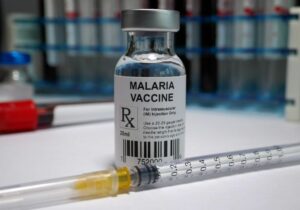Millions of dollars available to expand the use of malaria vaccine in Africa
 Funding of close to $160 million has been secured from Gavi to support the introduction, procurement and delivery of the RTS,S malaria vaccine for Gavi-eligible countries in sub-Saharan Africa.
Funding of close to $160 million has been secured from Gavi to support the introduction, procurement and delivery of the RTS,S malaria vaccine for Gavi-eligible countries in sub-Saharan Africa.
In October 2021, the World Health Organization (WHO) recommended the expanded use of the vaccine following findings from the ongoing pilot rollout of the vaccine in Malawi, Ghana, and Kenya and by other RTS,S evidence.
Mr. John Bawa, Africa Lead, Vaccine Implementation at Path, said countries eligible for Gavi support that decide to adopt the vaccine, including pilot countries such as Ghana would need to apply to Gavi.
Gavi, is a public-private global health partnerships created for increasing access to immunization and vaccines in poor countries.
Mr. Bawa, who was speaking at a meeting with a group of journalists from and outside Ghana, said the first application deadline from Gavi is expected in September 2022.
The virtual meeting was held to allow other journalists from outside Ghana to join a team of Ghanaian journalists who were on a visit to the Kintampo Health Research Centre (KHRC) as part of the commemoration of this year’s World Malaria Day celebration.
It was organized by the African Media and Malaria Research Network (AMMREN) in collaboration with the KHRC.
Mr Bawa said countries have begun considering whether to adopt the malaria vaccine as part of their comprehensive malaria control plans.
Adding that a grant of close to $5 million is also being made available to Ghana, Malawi and Kenya, the three countries piloting the implementation of the vaccine through their routine Expanded Programme on Immunization.
Ghana is piloting the vaccine in seven regions including the Bono region which houses the KHRC, one of the sites where the clinical trials of the vaccine took place several years ago.
According to Mr Bawa, the award of the funds would provide each pilot country with funds to expand malaria vaccination in the pilot areas.
He said the WHO guidance is now available to countries as they consider whether and how to adopt the vaccine as an additional tool to reduce child illness and deaths from malaria.
He explained that the anticipated high demand for the vaccine would far outstrip supply in the next few years.
“WHO and partners are working to accelerate increased supply, through increased manufacturing capacity of RTS,S and by facilitating the development of other first-generation and next generation malaria vaccines.”
“PATH is actively engaged with WHO, GSK, Gavi, UNICEF, and other stakeholders toward ensuring equitable access to malaria vaccines and future demand-supply balance, in the context of a healthy malaria vaccine market.”
He added that PATH is working in partnership with stakeholders, vaccine developers and manufacturers, to ensure sustainable, long-term supply of malaria vaccines.
“An agreement for product transfer was signed among PATH, GSK and Bharat Biotech (BBIL) in December 2020. PATH is helping to lead the knowledge transfer of access related activities from GSK to BBIL.”
“PATH has approximately 2.5 million donation doses for use to further optimize vaccine impact. PATH is currently exploring options for use of these doses with key stakeholders.”
Dr Thomas Gyan, in charge of the vaccine pilot evaluation at the KHRC, who spoke about the pilot studies in the three countries, said key findings showed that there was no negative impact of the vaccine introduction on the uptake of routine vaccinations
Adding that there is also no evidence that malaria vaccine led to an increase in incidence of hospital admission with meningitis or evidence that the malaria vaccine led to an increase in incidence of hospital admission with cerebral malaria.
He explained that the vaccine was able to reach children not yet protected by ITNs, extending the reach of malaria preventive measures to vulnerable children.
“Overall, more than 90 per cent of children benefitted from either sleeping under an ITN or RTS,S/AS01 vaccination.”
“Vaccine introduction resulted in a substantial and statistically significant reduction in hospitalized severe malaria and hospitalization with malaria infection.”
According to Dr. Gyan, there is confirmation that the vaccine can have substantial added benefit to reduce child illness and death from malaria.
Dr. Kwaku Poku Asante, Director of the KHRC, who made a presentation of the history of the clinical trials of the vaccine in Ghana and other countries in Africa, noted that in the past, it was common to see children being admitted in hospitals due to anemia and complications from malaria.
He said the development of new tools and drugs over the years has helped in cutting down on child morbidity and mortality.
Dr. Charity Binka, Executive Secretary of AMMREN, who moderated the meeting, said journalists from AMMREN have followed the journey of the clinical trials of the vaccine since it began in the 11 sites across the seven countries in Africa.
She touched on the role of the network and said the journalists were able to provide extensive publicity during the trials and had thus supported in the success story of the development and introduction of the vaccine.
By Eunice Menka
Copyright ©2022 by NewsBridge Africa
All rights reserved. This article or any portion thereof may not be reproduced or used in any manner whatsoever without the express written permission of the publisher except for the use of brief quotations in reviews.
